Jung Hae-in's Best K-dramas (+ Film & Reality Show)
D.P. | PRETTY NOONA WHO BUYS ME FOOD | ONE SPRING NIGHT | TUNE IN FOR LOVE | JUNG HAE-IN'S TRAVEL LOG | WHILE YOU WERE SLEEPING | PRISON PLAYBOOK
There’s a relatively new Korean word that didn’t exist when I was a kid: umchina/엄친아, which is a portmanteau for 엄마 친구 아들/umma chingu adeul, or mother’s friend’s son. The idea is that while this 엄친아 may not even exist in real life, he is the ideal person who Korean children are constantly compared to.
This August, Jung Hae-in will star in a tvN K-drama called “Mom’s Friend’s Son” or … “엄마 친구 아들.”
What I find appealing about Jung is that while he has a boyish quality that works well in the romance genre — really selling the emotions, he’s also stellar in action thrillers where you’re never sure if he’s the hero or villain.
Some of you may have noticed him in a couple episodes of Gong Yoo’s “Goblin.”
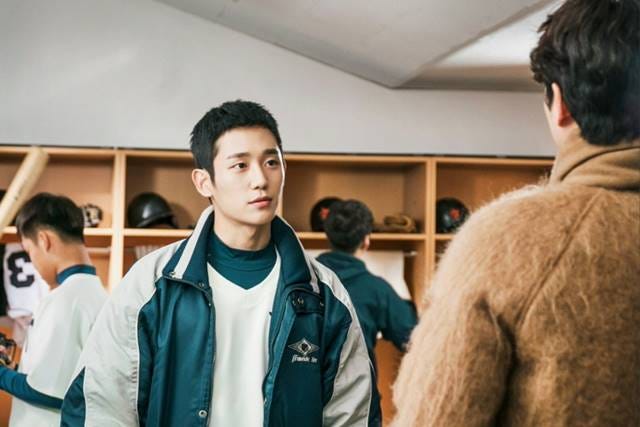
But do you recognize him here?
All of this leads to reviews of some of my favorite Jung Hae-in projects, which I’m sharing below. The anchor links will take you directly to the reviews — so pick and choose (or read them all).
And, as always, I’ve rated the following on a ☆☆☆☆ scale.
• D.P. (디피): Season 1 ☆☆☆½
• D.P. (디피): Season 2 ☆☆☆
• Jung Hae-In’s Travel Log (정해인의 걸어보고서) ☆☆☆
• One Spring Night (봄밤) ☆☆☆
• Pretty Noona Who Buys Me Food (밥 잘 사주는 예쁜 누나) ☆☆☆
• Prison Playbook (괜찮아, 사랑이야) ☆☆☆
• Tune in for Love (유열의 음악앨범) ☆☆☆
• While You Were Sleeping (당신이 잠든 사이에) ☆☆☆½
Let me know if you’ve seen any of these K-dramas (and film)! I’d love to hear (read?!) your views…
“D.P.”: Season 1
☆☆☆½
Private Ahn Joon-Ho (played by Jung Hae-In)
Corporal Han Ho-Yul (played by Koo Kyo-Hwan)
↑Note: Korean names denote the surname followed by the given name.
The superb “D.P.” is not an easy series to watch. While not as gory as “Squid Game,” it’s more disturbing in many ways, because it deals with South Korea’s real-life mandatory military duty — which requires every able-bodied Korean man to enlist for approximately two years.
Smart, but poor, Joon-Ho enlists in the army when he is drafted. Almost immediately, the private is harassed by his seniors, who revel in torturing their underlings. He is disgraced for the grammatical errors his mother makes in the letters she sends him. And during one game, Joon-Ho moves his head, rather than have it bashed into a large nail on the wall (like the soldier before him). He’s punished for not accepting a hole in his head.
Based on his height, Joon-Ho is recruited to serve in the military police. And based on his ability to think outside of the box, he’s assigned to be a D.P. (Deserter Pursuit) — a branch of the military police that brings back soldiers who’ve deserted. Some of the men left the barracks to protect their families. But most of the young men deserted to escape the daily torture of their fellow soldiers.
With his intuitive acting, Jung Hae-In (“One Spring Night,” “Something in the Rain“) — who played an officer accused of beating a soldier to death in “Prison Playbook” — clearly is the star of this series. But some of the best moments belong to Koo Kyo-Hwan (“Peninsula,” “Kingdom: Ashin of the North”), who plays his fellow D.P. and knows how to work the system. He is calm and clever and, most important of all, isn’t an asshole.
The series runs less than six-hours and features compelling storylines that make it very easy to binge this in one day. There are some scenes that are very difficult to watch, most particularly the sexual abuse of a soldier, which snowballs into even more tragedy.
“D.P.” is based on Kim Bo-Tong’s webtoon, “D.P. Dog’s Day,” which he wrote based on memories of his own military service. That it’s set in 2014 is no coincidence. That’s the year that one soldier was beaten to death by higher ranking officers, while another soldier attacked his bullies, killing five. (More in The Blue Roof.)
On DKDKTV, Danny and David Kim (not related) discuss their own military days in the South Korean army. They said that while they didn’t experience the kind of abuse depicted in “D.P.,” they didn’t flinch at the dramatization, because it was plausible. While discussing sexual harassment on military bases, I found it really telling that Danny at first said it never happened to him. But as they continued to talk, he remembered instances of unwanted touching. We are so conditioned that harassment isn’t really a big deal, unless there are visible signs of physical trauma.
When people try to justify this kind of “bullying” — it’ll make them stronger, everyone goes through it — as little more than boys-will-be-boys hazing, what they are essentially doing is justifying institutionalized torture. And this has to stop. As one of the victims said to his sympathetic superior, “You all knew about it and did nothing.”
Airdates: Six episodes, each between 45- to 55-minutes , were released on Netflix on August 27, 2021. This series is rated TV-MA and should be followed. The subject matter is intense. It deals with an onslaught of realistic abuse and depicts suicide. This is not for young children.
Spoiler Alert: Jo Hyun-Chul was brilliant in his portrayal of Jo Suk-Bong, a slightly higher ranking private than Joon-Ho, and the closest thing he has to a friend on base. An artist who teaches children to draw, he snaps one day after too many months of being bullied, humiliated and forced to masturbate for the enjoyment of an sadistic officer. The final episode and a half revolves around him kidnapping and torturing one of his bullies (who’s now a civilian) and the aftermath that results in his own death.
And here’s some trivia for you: Jo is the younger brother of Jo Dong-Rim, who’s better known by his rapper name of Mad Clown.
My review of the second season of the “D.P.” is here.
“Pretty Noona Who Buys Me Food”
☆☆☆
Yoon Jin-Ah (played by Son Ye-Jin)
Seo Joon-Hee (played by Jung Hae-In)
↑Note: Korean names denote the surname followed by the given name.
“Pretty Noona Who Buys Me Food” is sold as a May-December romance. That may be one reason I wasn’t eager to watch this series. While the central storyline delves into the relationship between the pretty noona and her childhood friend’s younger brother, the most compelling subplot — that wasn’t really fleshed out — was workplace sexual harassment.
By the way, this isn’t a May-December romance.
Joon-Hee is a 27-year-old college graduate who has already served his mandatory military service. Jin-Ah is a 35-year-old mid-level supervisor for a coffee company, who has a knack for becoming involved with inappropriate men. The age difference here is a non issue, unlike in “I Hear Your Voice” (where a teenager is involved).
When she catches her boyfriend — a weasel of an attorney from a “good” family — cheating, she breaks up with him. But despite this — and the fact that he will later assault and attempt to rape Jin-Ah — her social-climbing mother continually encourages her to try to make things work. All men have faults, she says, and there’s no perfect relationship.
While all this is true, it is unconscionable that a mother tries to convince her daughter to marry her abuser. What is so wrong with choosing never to marry? Or to work and provide for oneself, being happy with friends and choosing to have relationships (or not) that don’t end in marriage and children?
As the unsympathetic character, Jin-Ah’s mother is given the dialogue to say things about Korean society that I side-eye. For instance: Joon-Hee and his sister are viewed as being unsuitable catches, despite having steady jobs, their own apartments and being good people. Why? Because their mother died and their father has been married three times and abandoned the siblings to start new families with his new wives.
In other words, people like Jin-Ah’s mother blame the children for their father’s sins. In Episode 4, Jin-Ah’s mother says no decent family would welcome Joon-Hee because of his lineage.
Make no mistake about it: I don’t judge Joon-Hee’s father for his multiple marriages. But, I do find him to be a despicable person for throwing away his first set of children. It was not uncommon for kids to be thrown away in orphanages so that parents could remarry partners who didn’t want to take care of offspring who aren’t biologically related to them. Yes, there are some adults who cannot survive financially without remarrying. But all children rely on their parents for survival. Joon-Hee’s father was the family’s breadwinner, and left Joon-Hee in the care of his sister, who had to quit school to work and send her brother to college. Their father didn’t need to re-marry anyone for support. He chose to for his own happiness. So no matter how much the writers tried to pull at viewers’ heartstrings with his storyline, I wanted no part of it.
I wish the series had delved more into the sexual harassment aspect. It started off strong, with Jin-Ah and her colleagues banding together to fight their male bosses. But it piddled away into little more than an afterthought.
Observations: The series title sounds glib…almost ridiculous. But it’s common in Korea for the elder party to buy their younger friends meals. So when Joon-Hee wants to see Jin-Ah — but feels awkward about confessing how he feels about her — he uses his younger “brother” status as a way to spend time with her … via meals.
I thought it was interesting in an odd way that the soundtrack was comprised solely of songs sung in English. I didn’t dislike it, but I also didn’t see a need for it.
Airdates: Sixteen episodes aired on JTBC from March 30 to May 19, 2018.
Spoiler Alert: Jin-Ah’s mother tries to rationalize her prejudice against Joon-Hee by saying that he can’t date her daughter, because she thinks of him as her son. I will give her a bit of leeway, since Joon-Hee and his sister were best friends with Jin-Ah and her brother. They did spend a lot of time with each other. But they didn’t grow up in the same household. It would be like saying that children from the same neighborhood can’t marry each other, because they hung out with each other throughout their childhood.
In Episode 10, the truth comes out. The mom says point blank that he’s not good enough for them, because of his family. Jin-Ah and her brother both point out that while she thinks of them as being better than other people, there are plenty of families who think the same of them — that they aren’t good enough, either.
“One Spring Night”
☆☆☆
Yoo Ji-Ho (played by Jung Hae-in)
Lee Jung-In (played by Han Ji-min)
↑Note: Korean names denote the surname followed by the given name.
It’s not surprising that “One Spring Night” has the same melancholy vibe as “Something in the Rain” (aka “Pretty Noona Who Buys Me Food”). Besides the same leading man, the series reunites screenwriter Kim Eun and director Ahn Pan-Seok.
While the storyline is different, the main thrust remains the same: The central male character is deemed as unsuitable to be with the female character, because of an unforgivable character flaw. In “Something in the Rain,” he was considered defective because his mother was deceased and his father was a serial womanizer. Therefore, he came from a lineage that no woman would want to marry into.
Erm, no.
In “One Spring Day,” he is considered to be unsuitable for marriage because — wait for it — his college girlfriend got pregnant, didn’t tell him about it and then left him with their baby before moving overseas without ever contacting him again. With the help of his parents, he is raising his kindergartener without a woman in his life.
Shameful! Not.
In the United States, a man raising his child after his partner ran away would be celebrated. But in South Korea, the stigma against having children out of wedlock is still so severe that raising a child by yourself is a cause for national shame. Make no mistake about it: The shame is tenfold if you’re a single mom. Ji-Ho has a nice job as a pharmacist. Such a career most likely wouldn’t be available to a single mom.
Despite all that Ji-Ho has gone through, he refuses to demonize his ex-girlfriend. He says that she must’ve gone through rough times herself and did what she had to do to save herself.
One spring day, Jung-In walks into his pharmacy, asking for hangover medicine. They easily banter with one another. She has a long-time boyfriend, so she can’t get involved. But she also is intrigued by this man.
It’s clear that after dating her boyfriend for the past four years, the relationship has run its course. Jung-In knows that her boyfriend’s wealthy father doesn’t think she’s good enough to marry into their family. And while he at first comes across as a good guy, it becomes clear that Gi-Seok (Kim Jun-Han) has stopped trying in their relationship, because he figured that since he was the better catch of the two, he could get away with being lazy. He does care for her, but he views Jung-In as an inferior and therefore unacceptable suitor. After all, how would it look when people find out that he was dumped for a … single father!
It is brought up repeatedly that Ji-Ho should know his place — that he shouldn’t dream of being with a woman like Jung-In, because of his past. Even his own mother says that the most he should allow himself to hope for is to marry someone who also has a past, like a divorcee.
I wondered: If he had given his child up for adoption, would he have been viewed in a less harsh light? Would society have considered that a better option for Ji-Ho? After all, out of sight, out of mind, right?
As if there wasn’t enough turbulence in his life, Ji-Ho has to deal with Gi-Seok, who has turned out to be a vindictive tattletale. He makes it his mission to ruin Ji-Ho’s life by announcing to anyone who’ll listen that he is a single father. Because Ji-Ho does feel less than in many ways. he lets Gi-Seok get away with his pettiness. But then he starts to fight back.
There are so many elements of “One Spring Night” that seem like a throwback to another era, when women couldn’t do anything without their father’s permission. Jung-In is surrounded by caring women (her mother, sisters and friends), but her father is an oligarch whose wife and children fear. Say all you will about how he’s emasculated at work (by Gi Seok’s father), but that doesn’t make it right for him to treat the women in his family as bumbling children.
And no matter how many times Jung-In told Gi-Seok that they were through, he refused to listen to her. And even after it was public that she was dating another man, Gi-Seok, his father and her father still wanted to plan a wedding date for them.
W. T. F.?!!
Don’t even get me started on the subplot between Jung-In’s older sister, who was married to an abusive man. When the latter pretended to be sorry and apologized to her father (why are you apologizing to him? Oh yeah, because he’s a man…), the latter accepted it, saying that it happens.
Yes, it happens when you’re married to a wifebeater. Instead of encouraging them to remain together, the dad should’ve planted the soles of his feet on his son-in-law’s ass. And then he should’ve supported his daughter’s wish to divorce.
That said, I enjoyed watching Lee Moo-Saeng chew up the scenery as the abusive husband. I wondered why I couldn’t stand him at first sight (and he’s a good looking man who normally wouldn’t generate that kind of reaction from me). Then I remembered: He played a horrible character in “The Crowned Clown,” too.
A Few More Thoughts: Incidentally, Gil Hae-Yeon is beautiful in her role as Jung-In’s sympathetic mother. Her character is 180 degrees different from the female lead’s disapproving mom in “Something in the Rain.”
Unlike most K-Dramas, both this series and “Something in the Rain” had a soundtrack full of songs sung in English. Rachael Yamagata returns here to help set the mood. And former supermodel (and former French First Lady) Carla Bruni also has a track.
Airdates: MBC aired 32 episodes — each 35 minutes long — from May 22 to July 9, 2019
Spoiler Alert: Jung-In’s elder sister, Seo-In (played by Im Sung-Eon), is a top anchor for a television news program. She learns that she’s pregnant. Her husband raped her (this isn’t depicted in the series, but it’s clear what happened) and is hoping to use the unborn baby as a way of staying in his wife’s life. When he realizes that she will prosecute him for his crime and he’ll serve time in jail, he agrees to the divorce and to give up any parental rights. Realizing that Seo-In will become a single mother, her family begins to sympathize with Ji-Ho.
Though Seo-In’s career trajectory is on the upswing, she knows that netizens will drag her through the mud when news of her upcoming divorce is revealed. She quits her job to avoid a scandal. I wish that she had kept her job and then sued her employers if they tried to make her leave. Of course, it’s easy for me to say that. But it’s not so easy for women to live that life.
“While You Were Sleeping”
☆☆☆
Jung Jae-Chan (played by Lee Jong-Suk)
Nam Hong-Joo (played by Bae Suzy)
Han Woo-Tak (played by Jung Hae-In)
↑Note: Korean names denote the surname followed by the given name.
One of the things that I really love about Korean dramas is that many of them center around protagonists who knew each other as children — and reunite as adults. And such is the case with “While You Were Sleeping,” which follows a group of young adults who inexplicably see each other in their dreams.
There’s a lot going on in this series and so much of it is based on spoilers (which I’ll talk about later). So I’ll mention a few things that I really enjoyed in this series:
Jae-Chan and Hong-Joo (a prosecutor and broadcast journalist, respectively) are both fatherless. She sees Jae-Chan in her dreams. He ends up saving her life. After that, he begins to dream about her.
He also saves Woo-Tak (a police officer) and the latter subsequently dreams about Jae-Chan.
In most dramas, there are two handsome men vying for the affections of one woman and this series is no different. Honestly, Hong-Joo could’ve picked either Jae-Chan (played by Lee Jong-Suk of “W“) or Woo-Tak (played by Jung Hae-In, who was so good in “Pretty Noona Who Buys Me Food“) and I would’ve been fine. (I also would’ve been fine if the two men chose each other, to be honest.)
The internet seems to love hating on Suzy, saying she can’t act. This isn’t “Dream High,” where she was a teenage ingenue having to hold her own against Kim Soo-Hyun. She has grown into a talented actress and is so good in this series.
There are some intriguing cases in this K-Drama: A battered wife who refuses to prosecute her husband; a brother accused of killing his younger sibling; a doctor imprisoned for killing patients he says he never did; and the death of an Olympian with no signs of forced entry into her home.
Want to take a guess at how the athlete died? And what’s up with that creepy drawing?
Airdates: 32 half-hour episodes aired on SBS from September 27 to November 16, 2017.
Spoiler Alert: As young teenagers, Jae-Chan and Hong-Joo had met at their fathers’ funerals. Both had been murdered by a mentally-unstable soldier. Hong-Joo was a tomboy who wore her hair short and dressed in jeans and baseball caps. Jae-Chan had assumed that Hong-Joo was a boy.
The soldier’s older brother, Choi Dam-Dong, was a policeman (whose supervisor was Jae-Chan’s father).
I can usually spot plot twists from a mile away. But it took me a while to catch on that Dam-Dong (brilliantly played by Kim Won-Hae) is the fourth person who dreamt about the future. Now an investigator for the prosecutor’s office, he doesn’t let on who he is.
Through a flashback, we see that after his younger brother went on his killing spree, Dam-Dong was filled with guilt. He attempted to drown himself. But Jae-Chan went in the water after him and Hong-Joo pulled them both out. After that, Dam-Dong began to have dreams about the pair.
Dam-Dong’s death was bittersweet, but he was at peace with it. He had envisioned the day he would die and was able to right some of the wrong caused by his brother. That gave him (and the viewers) some much-needed closure.
Favorite Episode: Ep. 11. It revolves around a corrupt college professor and bestselling author, who uses his teaching assistants as unpaid servants. When one of his T.A.s speaks out about it, the professor strangles him and then throws him down an elevator shaft. The student is alive, but brain dead. Jae-Chan’s job is to prove that it was attempted murder. But the professor and his sleazy attorney claim the T.A. was drunk and caused his own accident.
Jae-Chan has to decide whether to perform an autopsy, which would make that victim’s organs unavailable for organ transplants. Unbeknownst to him, one of the beneficiaries of the organ transplant would be the young son of Jae-Chan’s colleague. Her reply as to why she agrees with Jae-Chan — even though her child could die — is heartbreaking. She says that as a parent, she would want to know how her son died and to make sure that the perpetrator was punished for his actions.
I kept wondering, though: Why didn’t the hospital perform a toxicology test to see exactly how much alcohol — if any — he had imbibed. That would’ve contradicted the defense’s claims that the college student was the cause of his own accident.
Are You Human?: You know that murder scene photo? It turns it there was no murder and that Woo-Tak’s high school friend — who had been charged with the crime — was innocent. The Olympian had a history of fainting. She fell, hit her head and bled out. The cult-like design made from her blood was caused by her robot vacuum, which then fell off her balcony (which they retrieved from the garbage dump later). Case solved.
Don’t get me started on how a forensics team wouldn’t be able to see the vacuum’s tracks in the blood …
“Tune in for Love”
☆☆☆
Mi-Soo (played by Kim Go-Eun)
Hyun-Woo (played by Jung Hae-In)
↑Note: Korean names denote the surname followed by the given name.
Set in the 1990s, “Tune in for Love” is a beautiful slice-of-life film focused on a young couple who meet as teenagers, lose touch, and reunite on and off throughout their twenties.
Mi-Soo works at the bakery that had previously been her late mother’s. Her first encounter with Hyun-Woo is when he enters her cafe, asking for anything with tofu in it. In Korea, it was customary to eat tofu upon release from prison.
Sure enough, the high school student had served time in juvenile detention after a classmate’s death. The film leaves it ambiguous whether the boy had been pushed off a roof while playing with his friends, accidentally fell or chose to die by suicide. But the incident left Hyun-Woo broken … and with a record that would hinder his ability to live the normal life he had always craved.
Kim Go-Eun and Jung Hae-In share wonderful chemistry together, as teenagers who briefly grow up together, before they are separated again, and again, and again. You may remember them from “Goblin,” where Jung played Kim’s first love. Their flirtation there was so sweet that I was rooting for their relationship more than the driving force of Kim and Gong Yoo’s dokkaebi/도깨비.
Their puppy love turns into real friendship, before they allow themselves to delve into a romantic relationship. Mi-Soo and Hyun-Woo are reunited the evening before he leaves for mandatory military service. She sets up an email account for him, but forgets to give him the password. They lose touch, as young adults do, but run into each other again when his new job is located in the same building as hers.
Misunderstandings will arise and Mi-Soo’s predatory boss will cause strife. But the ending is satisfying and will leave viewers feeling warm and content.
At just over two hours, the film feels much shorter and left me wanting to see more of the couple’s future. Director Jung Ji-Woo does a great job of keeping the plot moving, without rushing through it.
For people who lived through the 1990s, there are nostalgic moments, such as Mi-Soo’s computer running on Windows 95. And for people who didn’t, it may be difficult to imagine a time when staying in touch wasn’t something that was easy to do for everyone.
Theatrical release date: August 28, 2019. The film has a running time of 2 hours and 2 minutes.
Spoiler Alert: The couple breaks up seemingly for good when Mi-Soo learns from one of Hyun-Woo’s friends about the death of their high school classmate. Worried that his guilt is something he will carry forever, she tells him he doesn’t have to worry about it anymore: the deceased boy’s family has moved. Hyun-Woo doesn’t have to visit the family anymore on the anniversary of the boy’s death to pay his respects, she tells him. Hyun-Woo loses it and storms out of his apartment. When he returns, Mi-Soo is gone.
The film title refers to a radio show that both Mi-Soo and Hyun-Woo enjoy listening to. The movie closes with the radio host giving a shout out to Mi-Soo. She guesses correctly that the dedication is from Hyun-Woo and rushes over to the radio station. The two stare at each other through the window, smiling.
“Jung Hae-In’s Travel Log”
☆☆☆
“Jung Hae-In’s Travel Log” is a delightful series featuring the actor, Jung Hae-In (“Pretty Noona Who Buys Me Food,” “One Spring Night”). For eight hours, Jung — who is later joined by his friends Lim Hyun-Soo and Eun Jong-Gun — tours around New York (and a little bit of Canada). He was so awed by everything he saw, marveling at the sight of things that many of us are used to. But, I reckon that’s how most Americans would feel about visiting Seoul for the first time.
What I really enjoyed about this series was that he didn’t seem to care that he was at times overshadowed by his friends. He didn’t edit out moments where they excelled at something he wasn’t as good at. And he left in moments that made him appear (lovably) dorky.
Some of my favorite moments:
♥ They meet a man from India in the subway who is fluent in Korean. He has lived in Seoul for the past dozen years and was vacationing in New York. He helps them navigate their way to their destination.
♥ Jung may be a star, but he is a thrifty celebrity. Even if all he has leftover from his dinner are some sweet potato fries, he takes them back to his rental apartment. When a waitress gives him some oyster crackers, he is wide eyed and asks her if they’re 서비스/service. (In Korea, restaurants often give diners 서비스 — or a free item here and there. One of the subplots in “When The Camellia Blooms” revolved around a man being incensed that a pub owner refuses to offer him 서비스). I was laughing so hard at this part, because I would’ve been angry if I was ever charged for those tasteless crackers. Later, when his friends suggest they stop for a coffee break, he pulls out thermoses of instant coffee he made that morning (from those Korean coffee sticks that are both horrible and delicious at the same time). Granted, he did that to save money. But he also wanted them to see as much of New York as they could each day, so the thermoses were timesavers, too.
♥ Unlike many tourists who head straight for their comfort food — which for Koreans includes a trip to Koreatown — he indulged in all the western cuisine he had been curious about, such as authentic hamburgers, New York’s sweet oysters, stops at Michelin-starred restaurants and the famous Hala food truck, which operates in Seoul as well, but was less spicy than the one in New York, according to Jung. A spicy food lover, Jung insisted on having the food truck throw a ton of hot sauce on his food and suffered greatly. He was sweating, dabbing at his nose and looked like he was in pain. At that moment, a Korean American woman and her boss approached him. Turns out the non-Korean boss was the fanboy, who had wanted an introduction and a photo taken with the star.
♥ Eun had gone to school and lived in New York for years, so he’s bilingual. He takes Jung and Lim to his alma mater, Pace University. There, Jung is recognized by a group of girls, who call their friends, who call more friends…and soon the trio of Korean men have a gaggle of American coeds watching them practice basketball. Jung gets flustered when he misses his free throws. He gets even more flustered when Lim makes his free throws. The popup commentary is funny, but not particularly flattering to Jung. And this is when I knew that I admired Jung. As the producer of this series, he could’ve edited out bits that made him look jealous of Lim or peevish. (One of his fans even switched sides to Lim!) But he left it all in. Just like he left in the bits at a bar where a young woman comes over to introduce herself to them. It becomes obvious that the girl is most interested in Lim, who is a tad drunk and oblivious.
♥ But Jung’s acting skills are put to a good test when the trio takes part in an acting class at Pace. Thrown into the workshop, not understanding English very well or what the college seniors are saying in their dialogues, he still steals the show with his magnetic performance. The difference between a pro actor and students who were still trying to find their way was striking.
♥ Though he often plays the handsome guy role (for obvious reasons), Jung is just like us. Even though he’s young and in shape, he grunts 아이고/aigo to show how tired or exasperated he is.
I would love to see more seasons with Jung touring different cities. And though it may not be exciting or new to him, I hope he does a travel series around South Korea. Yes, he knows Seoul inside and out. But surely there are pockets of the country that would be a revelation to him — and the viewers — that would make for compelling viewing.
Airdates: The eight-part travel series debuted on November 23, 2019 on KBS2.
What I’ve Been Up To:
• Chung Ha Shares the Next Step in Her Evolution (Rolling Stone)
• American Melancholy: The Real Loss in "Past Lives" isn't love (Salon)
• TWICE Opens Up on Mental Health, Sisterhood, New Album (TODAY)
• Go Away With … Raymond Lee of “Quantum Leap” (Chicago Tribune)
© 2024 JAE-HA KIM | All Rights Reserved




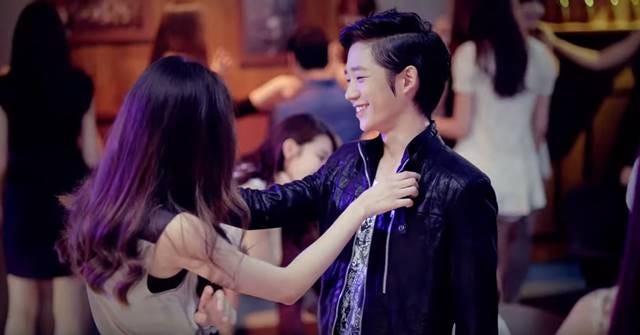
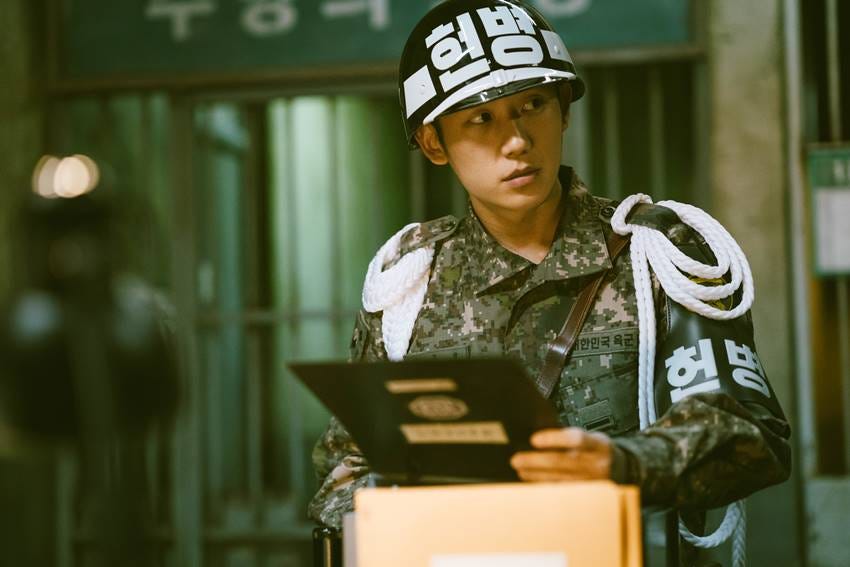
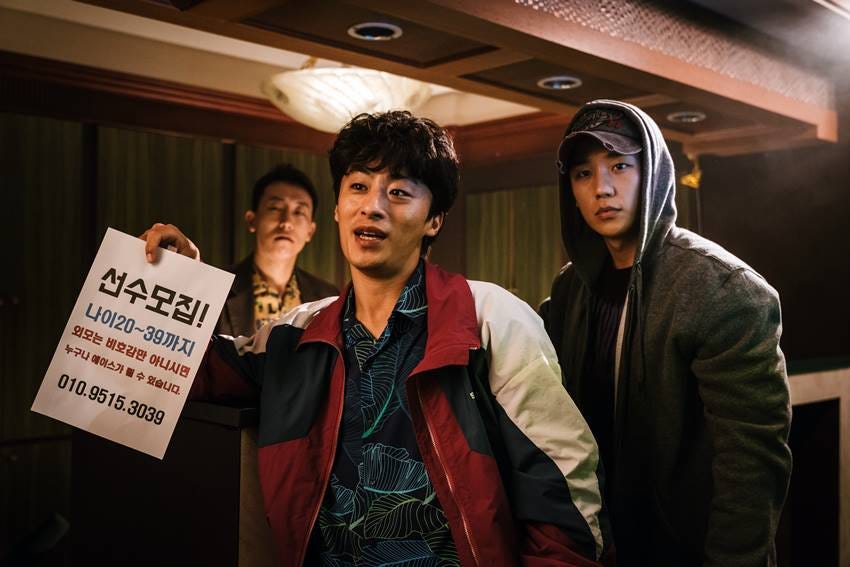
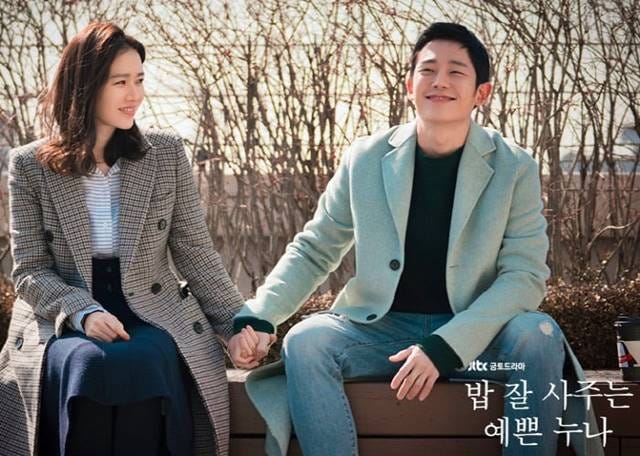
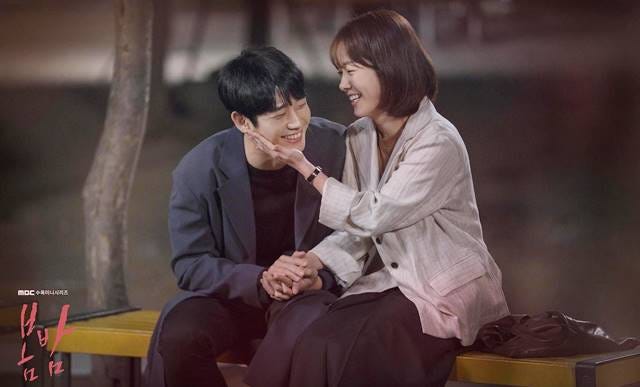
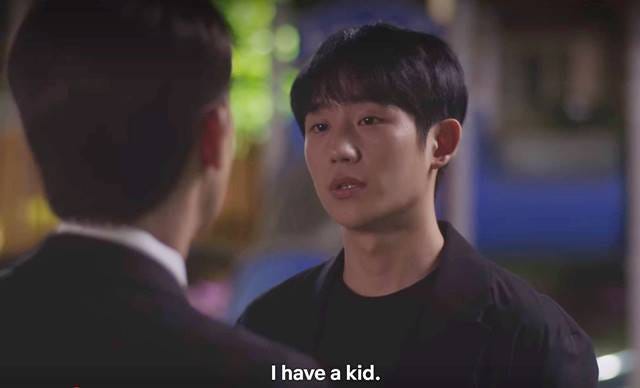
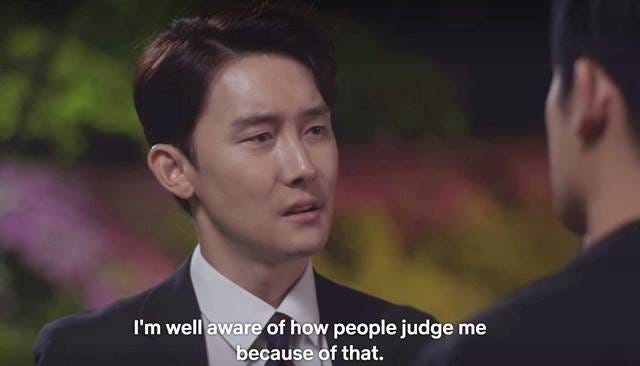
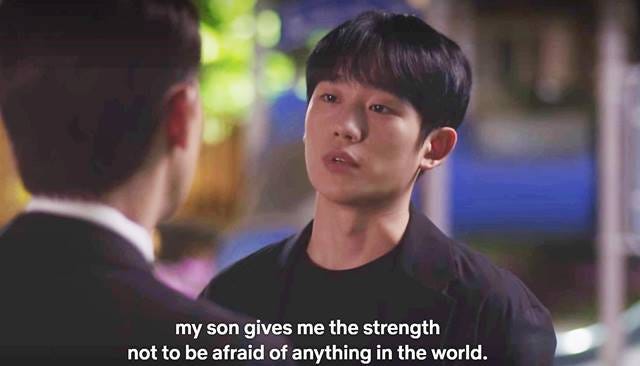
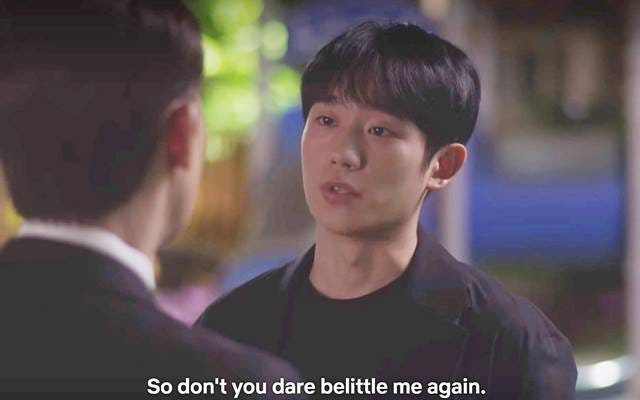
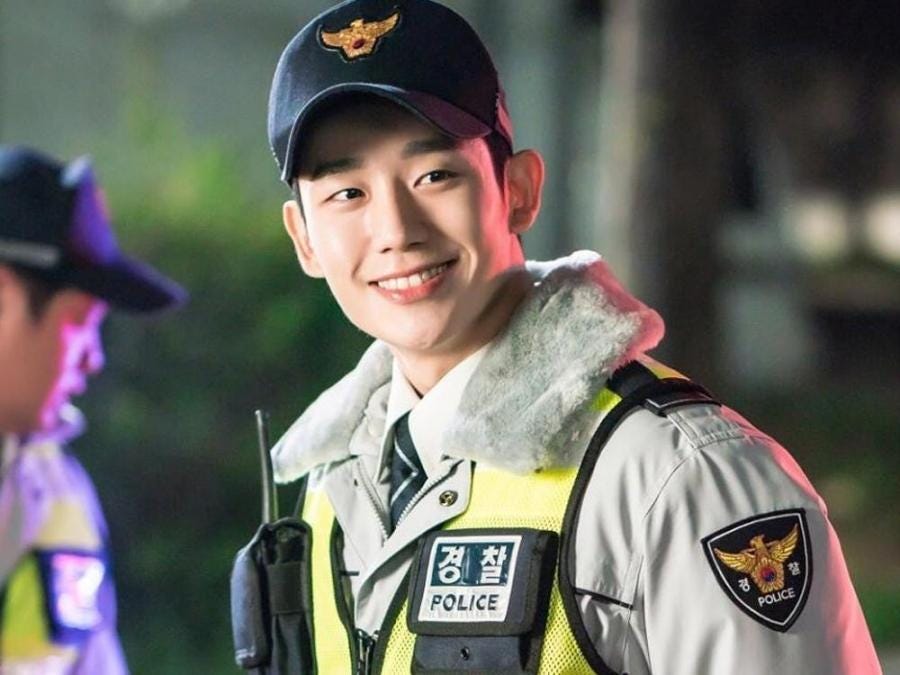
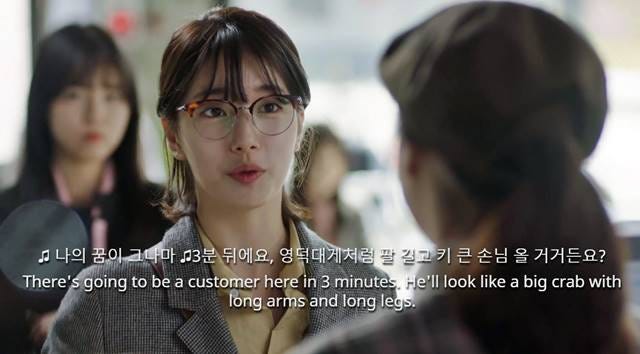
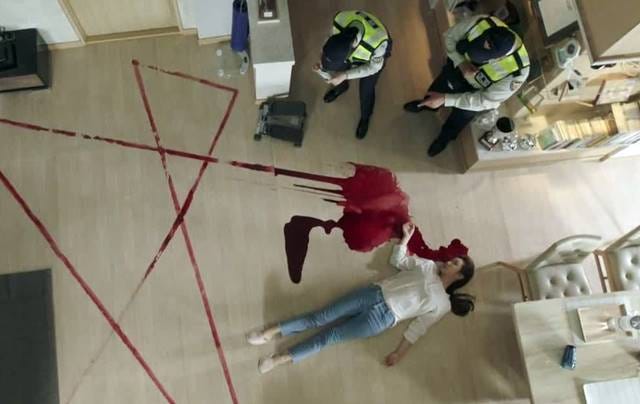
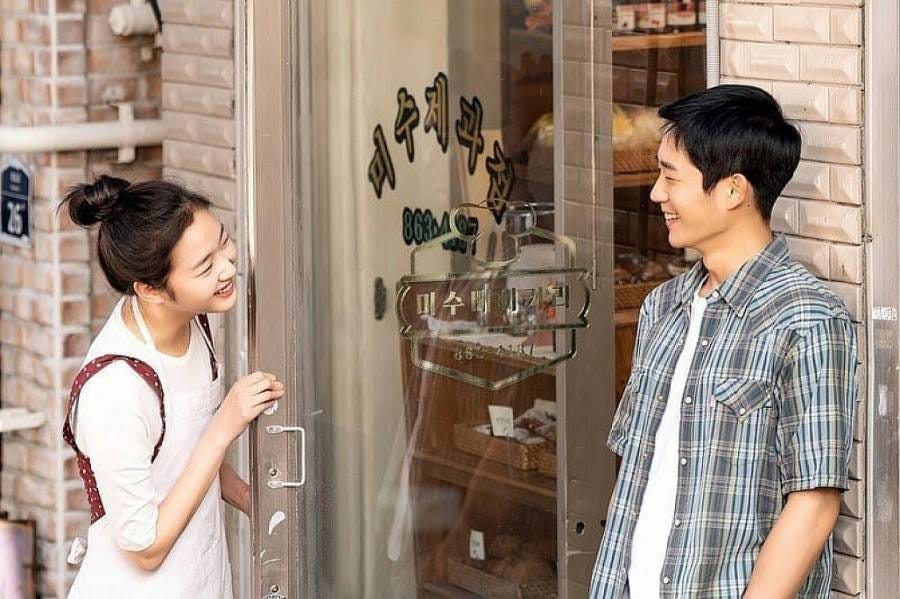
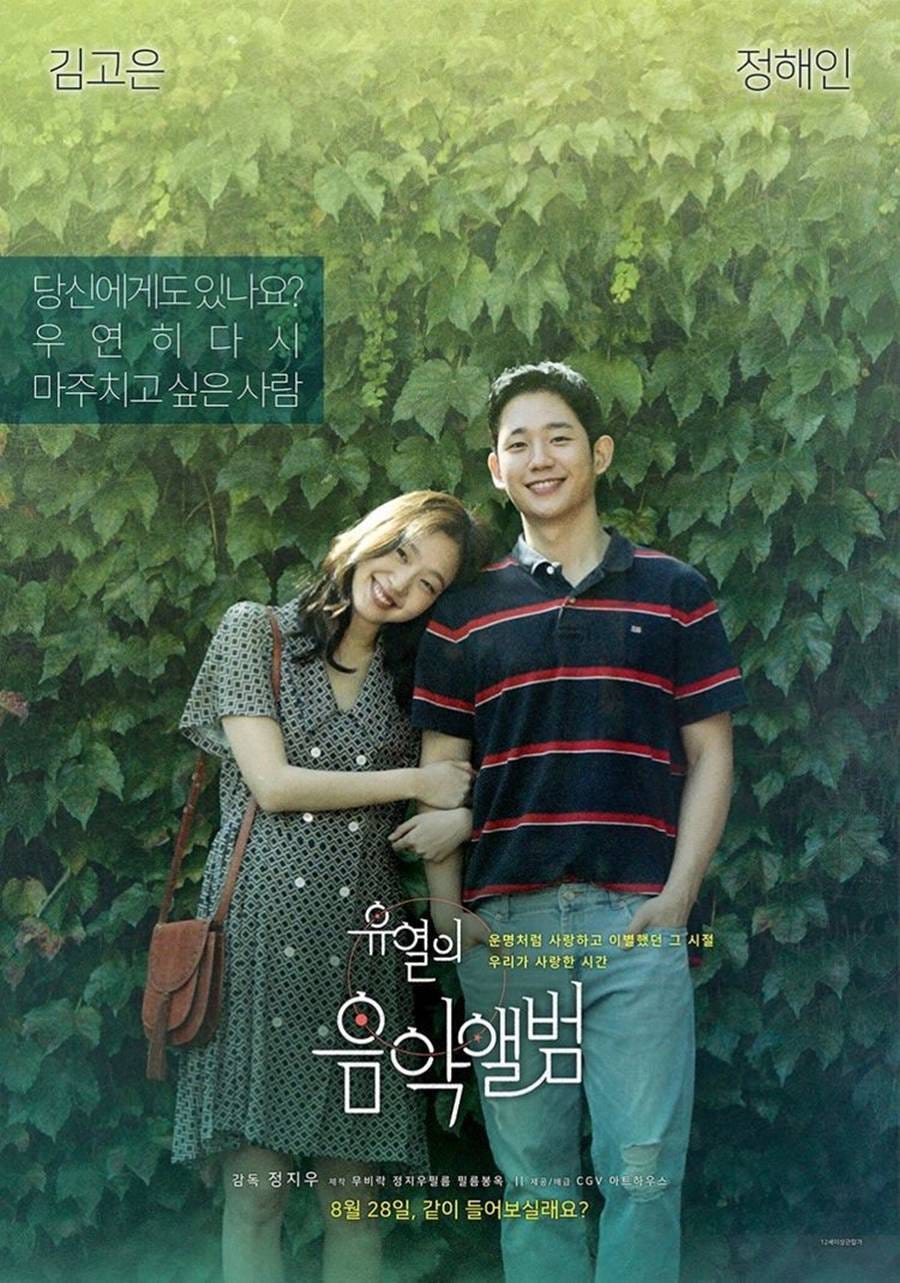
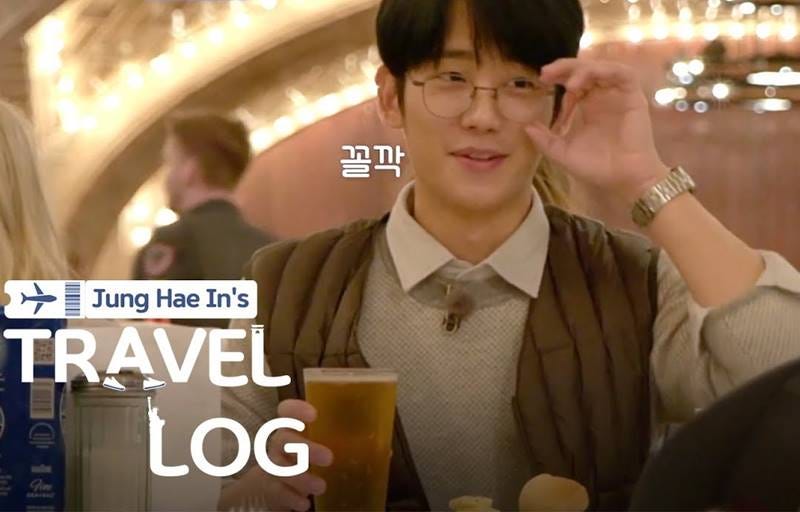
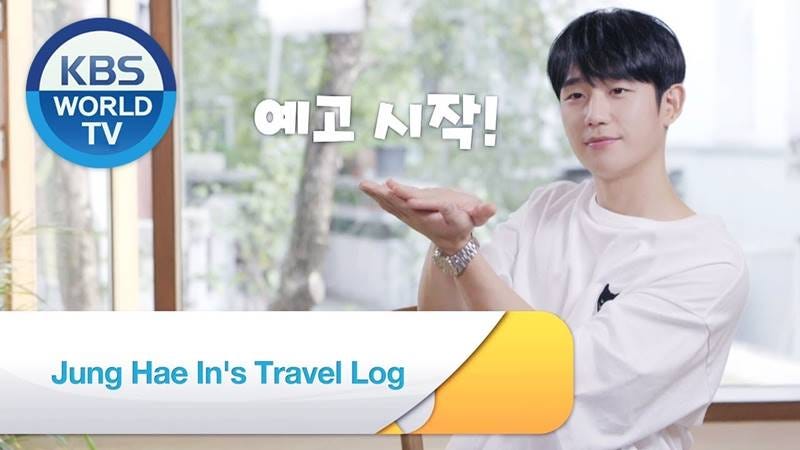
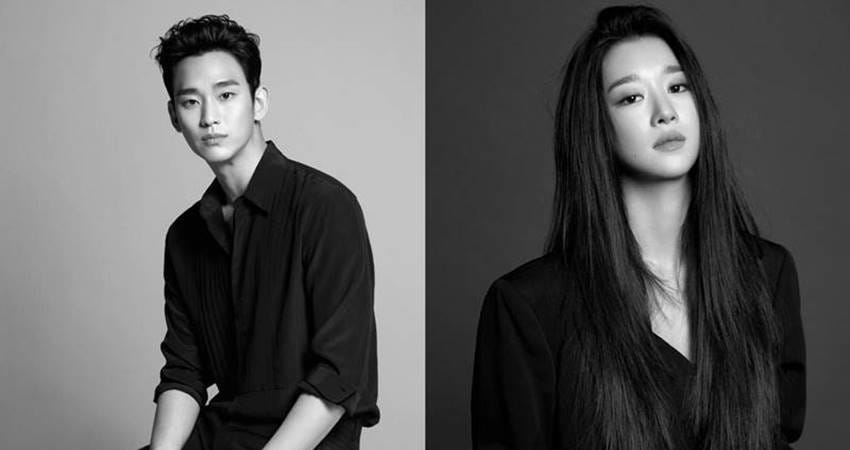
I know that series as 'Something in the Rain' and I loved it. I started to watch it because of Son Ye-jin who I'd seen in CLOY. I then also watched One Spring Night as it was by the same writer/director combo. I loved that too. I do not know the travel log, but if you have a link I would be very interested. Not sure if I can get access to it here in Australia, but I can dig around.
Jung Hae In was the first K-drama actor that stole my heart. “Pretty Noona” was the second k-drama I ever watched and I couldn’t get enough of him. He is so versatile in his acting. I also fell even more in love with him after watching his travel log. He just seems like such a sweet human. I can’t wait for his next drama!